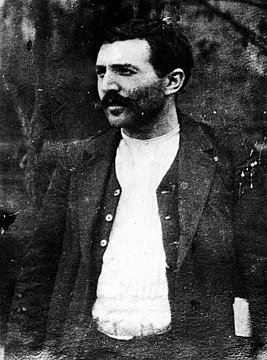Portal:Anarchism
Selected Anarchism-related content Anarchism is a political philosophy and movement that is against all forms of authority and seeks to abolish the institutions it claims maintain unnecessary coercion and hierarchy, typically including the state and capitalism. Anarchism advocates for the replacement of the state with stateless societies and voluntary free associations. A historically left-wing movement, anarchism is usually described as the libertarian wing of the socialist movement (libertarian socialism). Although traces of anarchist ideas are found all throughout history, modern anarchism emerged from the Enlightenment. During the latter half of the 19th and the first decades of the 20th century, the anarchist movement flourished in most parts of the world and had a significant role in workers' struggles for emancipation. Various anarchist schools of thought formed during this period. Anarchists have taken part in several revolutions, most notably in the Paris Commune, the Russian Civil War and the Spanish Civil War, whose end marked the end of the classical era of anarchism. In the last decades of the 20th and into the 21st century, the anarchist movement has been resurgent once more, growing in popularity and influence within anti-capitalist, anti-war and anti-globalisation movements. (Full article...)
Selected article
Norm Breyfogle, Batman: Anarky introduction, June 1998.
Batman: Anarky is a 1999 trade paperback published by DC Comics. The book collects prominent appearances of Anarky, a comic book character created by Alan Grant and Norm Breyfogle. Although all of the collected stories were written by Alan Grant, various artists contributed to individual stories. Dual introductions were written by the creators—both of whom introduce the character and give insight into their role in Anarky's creation and development. Featured as an antagonist in various Batman comics during the 90's, stories based on the character were highly thematic, political, and philosophical in tone. The majority of the collected stories ("Anarky in Gotham City", "Anarky: Tomorrow Belongs to Us", "Anarky") are influenced by the philosophy of anarchism, while the final story ("Metamorphosis") is influenced by Neo-Tech. Although anti-statism is the overarching theme of the collection, other concepts are explored. Under the umbrella of anarchist theory, anti-electoralism and the tactic of non-voting are the dual focuses of "Anarky: Tomorrow Belongs to Us", while economic exploitation, environmental issues, and political corruption are also repeatedly referenced. In "Metamorphosis", new emphasis was placed on previously unexplored themes, including the mind, consciousness, bicameral mentality, and the ethical value of honesty. Anarky's characterization was also expanded to present him as an atheist and rationalist, while determinism and free will became key elements in the character's discourse on the nature of evil. Literary references are also utilized throughout the collected stories to stress the philosophical foundations of the character. (read more...)Selected image Portrait of Benoît Broutchoux, French anarcho-syndicalist. Broutchoux was active in the French trade union movement and was among the Parisian bohemians arguing for free love at the turn of the 20th century. Did you know?
Selected quoteAnniversaries for December 22
Relevant listsCategoriesRelated portalsParent portals Socio-political portals Related WikiProjectsParent projects
Economics · Philosophy Socio-political projects Anarchism TopicsThings you can doThank you for your interest in improving the coverage of anarchism on Wikipedia!
Related WikimediaThe following Wikimedia Foundation sister projects provide more on this subject:
Discover Wikipedia using portals |
























